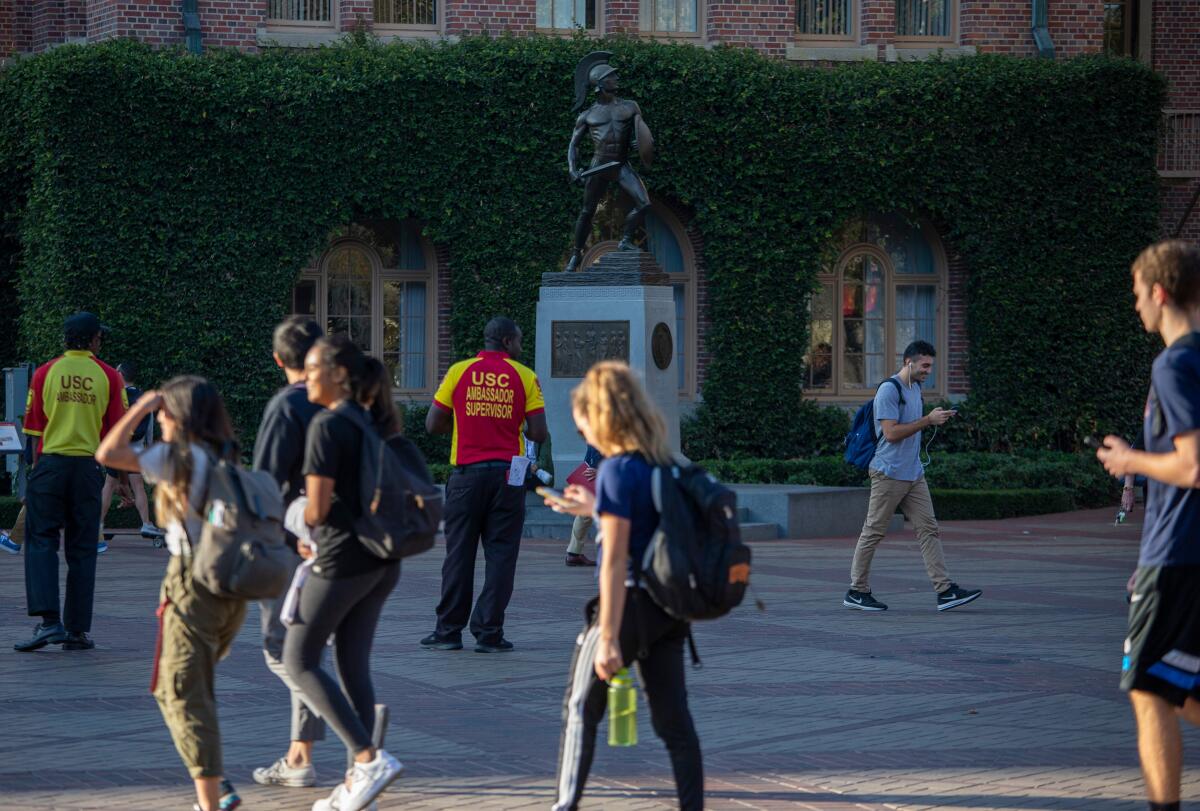Your college may ask you to sign a waiver for harm inflicted by COVID-19. Don’t do it

- Share via
When it comes to COVID-19, a college campus is like a cruise ship, a cinema multiplex and a restaurant all rolled into one. Yet many U.S. institutions of higher education are forging ahead with on-campus, in-person classes and activities for fall terms, making campuses likely hotbeds of illness. Some students, faculty and staff will likely have permanent damage. Some will probably die.
College administrators know this. These losses will arise from conditions they have created, and those who suffer them will no doubt sue schools for damages. Instead of following the lead of the California State University system and other schools whose fall semesters do not involve physical convening, many colleges are laying the groundwork to defeat liability arising from the illness and loss their decision is so likely to cause.
Whether compelled, pressured or lured into coming on campus, students and employees should explicitly inform relevant administrators that they are in no way surrendering their rights to hold schools accountable for sloppiness in safeguarding their health.
Schools are preparing to dodge even well-founded lawsuits — to assert that, in essence, students and employees who come to campuses thereby OK carelessness on the part of schools. The technical term for this sort of defense is “primary assumption of risk.”
Defendants who press it claim those they injured were aware of the risks the defendant created and that the victims voluntarily chose to encounter and assume these risks. When successful, this argument entirely defeats plaintiffs’ claims for recovery even when plaintiffs can prove the defendant failed to satisfy legal standards of care and thus caused injury.
Liability waivers are the most heavy-handed way universities are attempting to create the basis for later arguing that the school population consented to the risks of COVID-19 caused by being on-campus or by participating in school-sponsored off-campus activities. Ohio State, the University of Missouri and Southern Methodist University are among the schools requiring athletes to sign such waivers.
But colleges can set up arguments from consent without ever asking anybody to sign anything. They can claim that attendance itself proves consent. To pave the way, colleges and universities will try to make it seem as though those physically returning to the school grounds are being given meaningful options other than coming to campus — and that those who do come are well-informed of the dangers of doing so.
Many colleges, including USC, have announced “hybrid” operations for the fall term that create, at least on paper, the option of remote participation in classes for both faculty and students. These schools say they cannot guarantee safety or note that they will be operating only as safely as possible. It might seem like they are acting wholly benevolently.
But these schools can be expected to argue that hybrid schemes demonstrate that nobody was required to be on campus as a condition of participating in classes. They will claim that anybody who does come to campus and contracts the disease agreed to shoulder the associated risks — and so cannot get damages from the school, regardless of whether its carelessness caused illness, injury or death.
The liability waiver that the Trump campaign will require at its Tulsa rally reflects the pandemic lawsuit anxiety felt by many reopening businesses.
Students, faculty and staff should make it hard for schools to assert assumption of risk defenses. Individuals can document that although they may come to reopened campuses, they are not thereby voluntarily agreeing to risk of becoming infected with the new coronavirus and consequential illness, impairment or death.
Under no circumstances should anyone sign a waiver for harms and losses inflicted by COVID-19 cases caused by their college’s policies. Schools that try to force the issue by requiring signed waivers as preconditions for enrollment or pay are obviously coercing people into surrendering their rights to sue. That alone should defeat claims that waivers demonstrate that students and school personnel knowingly and voluntarily assumed risk and relieved the school of its duty of care.
Beyond rejecting explicit waivers, any employee or student who plans to be on a campus this fall should also inform supervisors, deans, presidents, and in-house counsel in writing that showing up does not imply any release of the institution’s legal responsibility to take reasonable measures against causing illness, including COVID-19.
At schools running hybrid academic programs, some students and faculty may believe they will be downgraded if they participate remotely. They should state this concern when they inform administrators they are not consenting to risks of illness and death from the coronavirus.
Colleges have aligned themselves with big-business lobbies seeking wholesale federal immunity from COVID-19-related civil liability. For the schools, assumption of risk defenses are the natural extension of this strategy, the private law alternative to legislatively created immunity.
It pains me to have to caution students, faculty and staff to protect themselves from legal tactics historically pressed by 19th century businesses seeking to foist risks of injury onto workers and customers. But by reopening campuses and encouraging physical gathering, universities are taking an adversarial and exploitative stance toward those who work and study under their auspices.
Heidi Li Feldman is a professor of law at Georgetown University.
More to Read
A cure for the common opinion
Get thought-provoking perspectives with our weekly newsletter.
You may occasionally receive promotional content from the Los Angeles Times.










